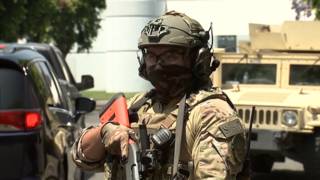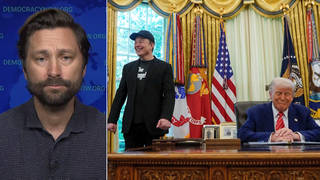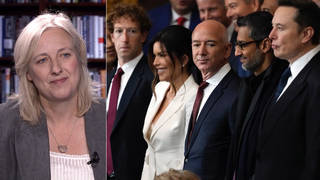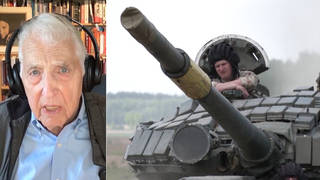
Over the past 50 years, Daniel Ellsberg remained an antiwar and anti-nuclear activist who inspired a new generation of whistleblowers. In his last interview with Democracy Now!, in April, he spoke about the war in Ukraine and why it required a diplomatic solution, and about the latest leak of Pentagon documents by Air National Guard member Jack Teixeira, who has been indicted on six counts of willful retention and transmission of classified information. We asked Ellsberg about what the leaks say about the war in Ukraine, and discussed his decision in 2021 to leak a classified government report that he had kept in his possession for decades, which revealed the U.S. had drawn up plans to attack China with nuclear weapons during the 1958 Taiwan Strait Crisis. Ellsberg warned the possibility of a nuclear first strike by the United States was an “insane” policy that would end most life on Earth. “The belief that we can do less bad by striking first than if we strike second is what confronts us in Ukraine with a real possibility of a nuclear war coming out of this conflict,” Ellsberg said.
Transcript
AMY GOODMAN: This is Democracy Now!, democracynow.org, The War and Peace Report. I’m Amy Goodman.
Today we remember Pentagon Papers whistleblower Daniel Ellsberg, who died on June 16th at the age of 92, just months after being diagnosed with pancreatic cancer. His actions helped take down President Nixon, end the War in Vietnam, and lead to a major victory for press freedom. Over the past 50 years, Ellsberg remained an antiwar and anti-nuclear activist who inspired a new generation of whistleblowers. We return now to our April interview, when I asked Dan Ellsberg about what a recent leak of Pentagon documents say about the war in Ukraine.
DANIEL ELLSBERG: It’s shown from the reaction to these leaks, the major leak being, once again like the Pentagon Papers, that when a war appears to be stalemated, it may be stalemated from the inside just as well. That’s what the Pentagon Papers showed, that there is no real prospect for progress and that killing people is, on either side, unjustified by any prospect of any humane result.
Intelligence estimates have shown that a year from now we will probably be in pretty much the same positions — a stalemate — and will not be willing to negotiate. What does that say about our — the people who are making our foreign policy? If that doesn’t define a crisis and emergency, what would? Well, yes, I suppose the prospect that we’re about to lose within a month, and that’s not what either is facing yet.
I don’t want to test how either side reacts, if they’re facing that, if the U.S. were to do what Biden is urged to do by many, which is direct U.S. participation in the war, shooting Russians, as I say, for the first time since 1920. A year after, two years after the First World War ended, we were still shooting at Russians, against Bolsheviks, in 1920. Every Russian knows that. How many Americans know that? Any? So, they have that very much in their memory.
When Biden is urged to send direct planes, that Ukrainians can’t yet operate, like the F-16, tanks that they cannot yet operate, the tendency to send Americans to operate those tanks and get them right away into business will be very strong along with that. I can only hope that Biden will be pressed by a large part of the public, pressed not to involve the U.S. directly in that war, and to be pursuing negotiations, which it is currently absolutely eschewing, is rejecting the idea of negotiations.
There’s increasing information that one year ago, in early April 2022, Zelensky and Putin essentially had an agreement, were within very close to an agreement, on prewar status quo, returning to a prewar status quo in Crimea and the Donbas, in relation to NATO and everything else, but that the U.S. and the British, Boris Johnson, went over and said, “We are not ready for that. We want the war to continue. We will not accept a negotiation.” I would say that was a crime against humanity. And I say that with all seriousness to the idea that we needed to see people killed on both sides in order, quote, “to weaken the Russians,” not for the benefit of the Ukrainians, but for an overall geopolitical strategy, was wicked.
And however the war started, and, I think, with both incredibly bad judgment by Putin, and aggression and atrocity, and, on the other hand, provocation by the United States, in the sense of policies that were consciously foreseen to increase the probability of a Russian crime of this sort, tells me that I think there were a lot of Americans who wanted this war. And they got exactly what they wanted, even better than they could have imagined — huge arms sales to our allies, the U.S. again having an essential role in Europe with an indispensable enemy, an enemy that we could not run the world without, Russia. And Russia stepped into that role very willingly. To say that Russia had no choice but to do what they did do is fairly absurd. That’s like saying you can provoke a person to shoot themselves in the foot or, in this case, to kneecap themselves. Putin had no choice but to kneecap himself and to give himself 800 more miles of adversarial border with Finland and to resuscitate NATO and get these arms sales and so forth — is just absurd.
AMY GOODMAN: I also wanted to bring up China, because in 2021 you revealed that the government had drawn up plans to attack China with nuclear weapons over a crisis in the Taiwan Strait. Can you talk about the relevance of that today, and when you got that information?
DANIEL ELLSBERG: Yes. I revealed that information right after The Economist magazine had a cover with Taiwan on the cover and a big bull’s mark, bull mark, on the front of it, showing that it was, quote, “the most dangerous place” in the world at that point. And what was at stake was a U.S. intervention in the politics of China, namely, supporting a secession movement, an independence movement, by a portion of China regarded almost universally by Chinese as part of China, supporting it in a way which the Chinese were totally forecasting would lead to war, that they would not accept it any more than Lincoln accepted the secession of the Confederacy, in this case.
And we were pressing for that in a way that I have to say I can’t entirely understand. People act as if they want war with China. How can that be? Selling them arms? Yes, I see that. But why they — why they want to change the relation of Taiwan, which has been pretty much the same since 1979, right now in a way that the Chinese guarantee us will lead to war is inscrutable to me. But anyway —
AMY GOODMAN: And you said that these nuclear war plans over the Taiwan Straits were made in 1958?
DANIEL ELLSBERG: '58, yeah, that's right. And by the way, there was almost a corresponding crisis earlier, in 1954, '55, so this was known as the second Taiwan crisis in the ’50s. But the idea there was that we would initiate nuclear war if the Chinese successfully bombarded by artillery islands that were within artillery range, actually within visual range of the mainland, very easy. A couple of them are just a mile or mile and a half off from the mainland. To keep those rocks from control by Beijing, we were prepared to send in U.S. planes to block that blockade — send in U.S. ships to break that blockade. And if the artillery kept that off or there was a danger of losing U.S. ships, we would hit Chinese targets as much as — as far away as Shanghai, which would certainly, in Eisenhower's terms, and who okayed this, if necessary, if necessary to get through to those islands, we would initiate nuclear war. And he foresaw that as leading to Russian — the ally of China — attacks on Taiwan and on Okinawa, on Guam, even on Japan, which, in turn, guaranteed, in terms of our planning, all-out nuclear war, hitting every city in Russia and China, killing, as our estimates were at that time, 600 million people, a hundred kilowatts —
AMY GOODMAN: And their relevance today?
DANIEL ELLSBERG: — over Taiwan. And that was what they — that’s what they were planning to do then. The number of targets in China has not reduced since then. That was a time when any fighting with the Russians, under Eisenhower, even if it started over Berlin, was guaranteed to include targeting China as a whole, as well. That may have changed to some extent, but to a large extent, at various times, we’ve still continued to say, “Shouldn’t we have a plan for war with Russia that doesn’t include destroying China?” To which the answer is, “Well, do you really want to destroy Russia and not China also? We’ll be destroyed in the process. That would leave China ruling the world.” In short, Russia and China have to be regarded as a joint target complex. OK?
This is insanity. This is a form of insanity as a kind of myth and hoax that has taken over the public. It is as insane as QAnon or as the belief that Trump is the president currently of the United States. And yet, the belief that we can do less bad by striking first than if we strike second is what confronts us in Ukraine with a real possibility of a nuclear war coming out of this conflict — in other words, of most life on Earth — not all, most life on Earth — being extinguished as a matter of the control of Crimea or the Donbas or Taiwan. That’s insane.
Who is going to face up to that? I call again to the young people that Greta Thunberg has mobilized on us to say, “The adults are not taking care of this, and our future absolutely depends on this changing somehow fast, now.” The picture I was looking at, which I’ll — I can show you here, I guess — I just happen to have it by me here — was when I was in Norway. I was getting an Olof Palme award. And we went over to where this girl had just started Fridays for the Future and a Strike on Climate — at first, days and weeks entirely by herself. And then, eventually, she was joined by a few others, as you can see in that picture. This was, I think, in early January, after she had started. She had 50 or 60 people in the snow on Friday morning, not Saturday morning, not Sunday morning, but instead of going to school. People said — her teacher said, “This is all very well, what she’s doing, but she needs to be studying in school.” And her attitude was, “What is there going to be to study about, or what use will that make, if the climate has changed the way it’s going?” The reason I admire her so much is not only the brilliance of this movement, her acting on her own initially, taking the initiative, advising others, doing it in the form of a general strike, which is — I think, is a really important way of demonstrating nonviolent action, their withdrawal of support.
AMY GOODMAN: Daniel Ellsberg, speaking in April. He died June 16th. When we come back, we talk to him about The Doomsday Machine: Confessions of a Nuclear War Planner.
[break]
AMY GOODMAN: “Thank You Daniel Ellsberg,” by Bloodrock.













Media Options